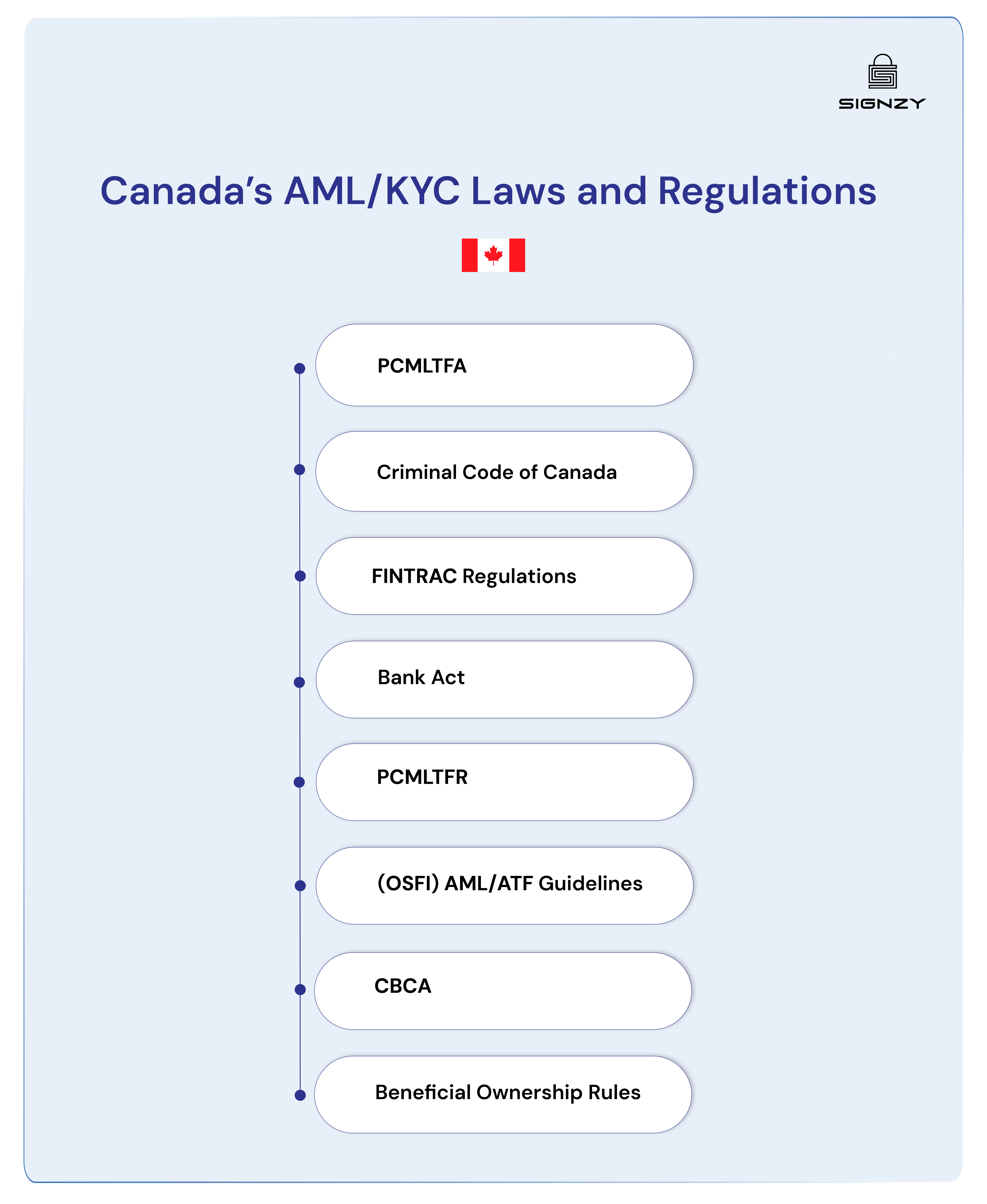Canada’s AML/KYC Compliance: Rules, Regulations and Penalties
- The core law is the Proceeds of Crime (Money Laundering) and Terrorist Financing Act (PCMLTFA), but multiple regulations and agencies work together to enforce AML/KYC compliance.
- Banks and financial institutions spend $274 billion annually on compliance with AML and KYC regulations.
- In 2018, it was estimated that $47 billion was laundered in Canada through various financial systems.
When talking about Canada’s AML and KYC requirements, most businesses are either overcomplicating or underestimating these regulations.
If you’re not sure what’s required or how to implement them without disrupting your operations, this blog is for you. We’ll break down the key steps to compliance and show you how to streamline the process.
Don’t risk penalties or damage to your reputation, read on to find out what you need to know.
Canada’s AML/KYC Laws and Regulations – Quick Rundown

| Law / Regulation | Purpose | Who It Applies To | Key Requirements |
|---|---|---|---|
| PCMLTFA (Proceeds of Crime (Money Laundering) and Terrorist Financing Act) | Core AML law sets compliance and reporting rules | Banks, fintech, MSBs, casinos, real estate, securities, accountants, law firms (financial transactions) | KYC verification, suspicious transaction reporting, record-keeping |
| Criminal Code of Canada | Defines money laundering & terrorist financing as criminal offenses | Everyone (individuals & businesses) | Prohibits involvement in money laundering and requires businesses to prevent it. |
| FINTRAC Regulations | Specifies how reporting entities must comply with PCMLTFA | Banks, fintech, MSBs, casinos, real estate, securities, accountants | Customer due diligence (CDD), enhanced due diligence (EDD), record-keeping |
| Bank Act | Sets AML obligations for federally regulated financial institutions | Banks, credit unions, insurance companies | Requires banks to have AML programs, conduct risk assessments |
| Proceeds of Crime (Money Laundering) and Terrorist Financing Regulations (PCMLTFR) | Detailed rules for implementing PCMLTFA | Financial institutions, MSBs, crypto exchanges, accountants, lawyers | Beneficial ownership rules, politically exposed persons (PEP) screening, transaction monitoring |
| Office of the Superintendent of Financial Institutions (OSFI) AML/ATF Guidelines | Compliance guidelines for financial institutions | Banks, insurance companies, trust companies | AML risk management, internal reporting obligations |
| Canada Business Corporations Act (CBCA) – Beneficial Ownership Rules | Increases transparency in company ownership | Corporations & businesses | Requires companies to disclose beneficial ownership to regulators |
Overview of Canada’s AML and KYC Compliance
Canada’s AML and KYC laws are designed to stop money laundering, terrorist financing, and financial fraud. These regulations are enforced by various regulatory bodies, with FINTRAC (Financial Transactions and Reports Analysis Centre of Canada) playing the lead role.
Other agencies like OSFI, RCMP, CRA, and CBSA also play roles in enforcement. The system follows a risk-based approach, meaning higher-risk customers face stricter checks.
Companies must keep records, report large or suspicious transactions, and ensure transparency in ownership structures. Specific laws and regulations are coming up next.
💡 Related Blog:
Canada KYC and AML/ATF Requirements
Canada’s Anti-Money Laundering (AML) and Anti-Terrorist Financing (ATF) regulations are primarily governed by the Proceeds of Crime (Money Laundering) and Terrorist Financing Act (PCMLTFA) and its associated regulations.
Here’s a breakdown of the key regulations.
1. Proceeds of Crime (Money Laundering) and Terrorist Financing Act (PCMLTFA)
The PCMLTFA is the foundation of Canada’s AML/ATF framework. It mandates businesses to:
- Verify the identity of clients and beneficial owners when onboarding businesses.
- Report suspicious transactions, large cash transactions ($10,000+), and electronic funds transfers ($10,000+).
- Keep records of business relationships, third-party transactions, and high-risk activities.
- Implement AML/ATF compliance programs, including risk assessments and audits.
Failure to comply can result in heavy fines and reputational damage.
2. Financial Transactions and Reports Analysis Centre of Canada (FINTRAC) Compliance
FINTRAC is Canada’s financial intelligence unit (FIU) that enforces AML/ATF rules. Businesses must:
- Submit reports on suspicious transactions, large cash transactions, and international money transfers.
- Conduct ongoing monitoring of business relationships to detect unusual activity.
- Ensure their compliance programs align with FINTRAC’s risk-based approach.
FINTRAC also conducts audits and issues penalties for non-compliance.
3. Corporate Transparency Act and Beneficial Ownership Registry
By 2025, federally incorporated companies must disclose beneficial ownership details in a publicly accessible registry. This enhances transparency and helps financial institutions verify corporate clients.
4. Politically Exposed Persons (PEP) and Sanctions Screening
Businesses must screen corporate clients and their UBOs against:
- Sanctions lists (e.g., Special Economic Measures Act).
- Terrorist financing watchlists.
- Foreign and domestic PEPs, including their family members and associates.
If a PEP or sanctioned individual is involved, enhanced due diligence and reporting measures apply.
5. Customer Due Diligence (CDD) and KYB Requirements
Canada’s rules require businesses to:
- Verify a company’s legal status and registration (e.g., via corporate registries).
- Identify and verify Ultimate Beneficial Owners (UBOs) who own 25% or more.
- Determine if the business is acting on behalf of a third party.
- Screen for Politically Exposed Persons (PEPs) and Heads of International Organizations (HIOs).
If a business structure is complex or ownership details are unclear, additional due diligence is required.
6. Ongoing Monitoring & Risk Assessment
Businesses must continuously monitor transactions to detect suspicious activities.
High-risk clients require periodic KYC updates and closer transaction reviews. Low-risk clients may have longer review cycles, but must still undergo periodic reassessment.
Any sudden change in transaction patterns, unusual international transfers, or other red flags must trigger further investigation and, if necessary, STR filings to FINTRAC.
7. Money Services Businesses (MSBs) Registration and Compliance
MSBs, including payment processors, foreign remittance providers, and crypto exchanges, must:
- Register with FINTRAC and undergo regular audits.
- Perform KYB checks on business customers and monitor high-risk transactions.
- Report large virtual currency transactions ($10,000+) to FINTRAC.
Unregistered MSBs operating in Canada can face shutdowns and legal penalties.
8. Sanctions and Terrorist Property Reporting
A new requirement under the Sanctions Reporting Framework mandates that businesses report:
- Any assets linked to sanctioned individuals or entities.
- Suspected terrorist property holdings.
This expands beyond traditional AML reporting to cover economic sanctions violations.
9. Third-Party Determination
When a customer acts on behalf of another party, businesses must determine and document who the actual controlling party is.
If a business client is owned or controlled by another entity or person, financial institutions must verify the beneficial owner and assess their risk level. This prevents individuals from using straw owners or shell companies to hide illicit activity.
Moreover, institutions must also record and retain documentation of the third party’s relationship to the business customer for regulatory audits.
Penalties for Non-Compliance in Canada
| Violation | Penalty Type | Fine / Consequence |
|---|---|---|
| Failure to report suspicious transactions (STRs), large cash transactions, or electronic fund transfers | Administrative Monetary Penalty (AMP) | Fines vary based on severity, up to millions in some cases |
| Failure to implement an AML compliance program | AMP | Fines can range from thousands to millions, depending on deficiencies |
| Criminal offense – Summary Conviction | Criminal Charge | Fine up to $250,000 CAD and/or up to 2 years less a day in prison |
| Criminal offense – Indictment | Criminal Charge | Fine up to $500,000 CAD and/or up to 5 years in prison |
| Failure to verify customer identity (KYC violations) | AMP | Fines are issued based on the risk and severity of non-compliance |
Getting Started
By understanding and implementing the right AML and KYC practices, you’re already a step ahead in protecting your business.
But to make this process even easier, integrate solutions like UBO (Ultimate Beneficial Owner) and KYB (Know Your Business) verification APIs to streamline your compliance efforts even more.
These tools ensure that you’re not only meeting regulatory requirements but also safeguarding your business against risk. To see how Signzy’s APIs can help, book a demo – HERE.
FAQ
What happens if a business fails to report suspicious transactions?
What is the main AML law in Canada?
How do businesses verify customer identities under KYC rules?
What is the reporting threshold for cash transactions?

Shivam Agarwal
Shivam heads the go-to-market strategy at Signzy. He holds the CFA charter and a strong background in financial operations, PE analysis and strategy. His prior roles include business strategy and private-equity analysis in the financial services and fintech domain, giving him deep insight into client needs, risk-adjusted economics and monetisation models for compliance & identity verification platforms.


